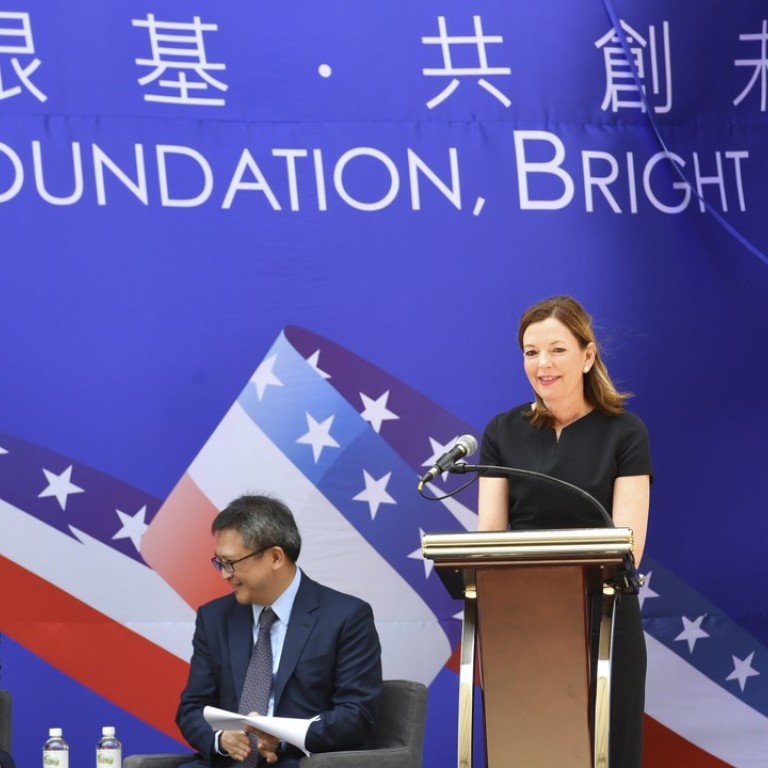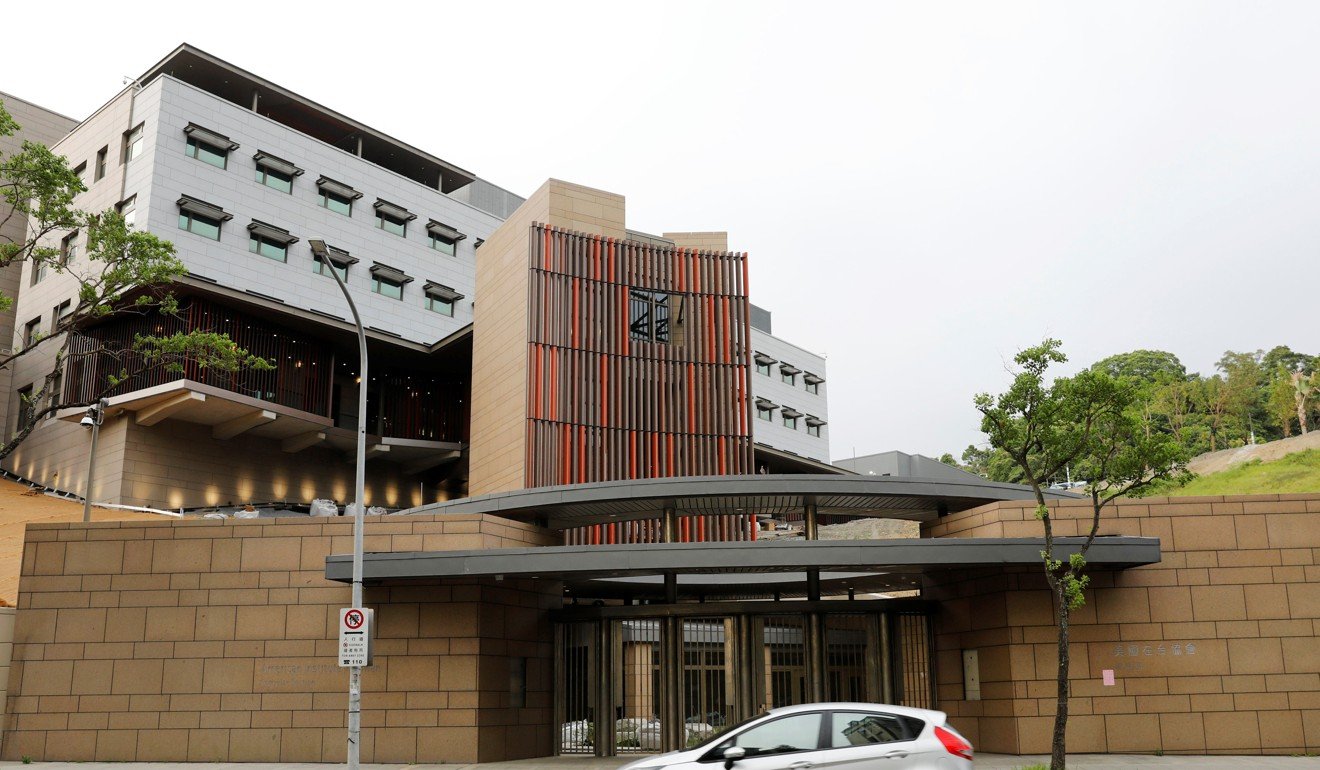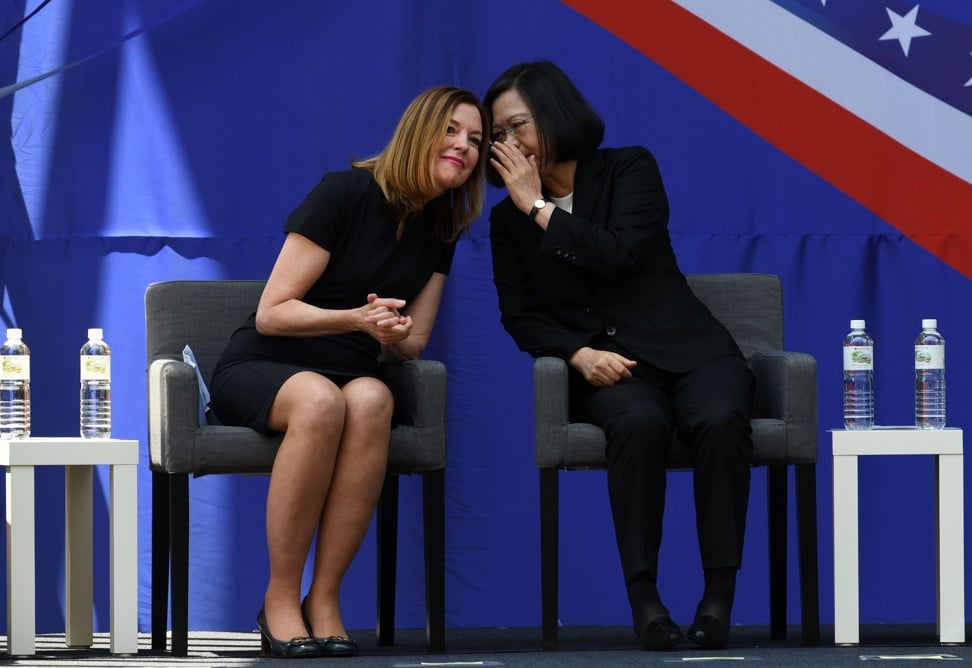
US unveils new ‘embassy’ in Taiwan amid strained ties with China
Trump administration sends lower ranking officials to ceremony at de facto embassy, with US and China already embroiled in major trade dispute
The United States formally unveiled its new de facto embassy in Taiwan on Tuesday, signalling its continued commitment to helping defend the island amid escalating tensions between Taipei and mainland China.
Analysts said while the move was certain to please Taipei and infuriate Beijing, it would be important to see whether the office will take on a more official role, facilitating contact between the US and Taiwanese governments.
A dedication ceremony for the US$250 million four-storey office compound was attended on Tuesday morning by senior officials from Taiwan and the US, including the island’s President Tsai Ing-wen.
The new base for the American Institute in Taiwan is said to be the strongest and most secure structure ever built on the island, made with blast-proof materials over nearly 10 years.
A number of its building materials were shipped from the US, according to AIT officials.
Marie Royce, assistant secretary of state for educational and cultural affairs, was one of the representatives for the US government, with many officials accompanying US President Donald Trump for his summit in Singapore with North Korean leader Kim Jong-un.
“It represents much more than steel and glass and concrete,” Royce said at the ceremony. “The new office complex is a symbol of the strength and vibrancy of the US-Taiwan partnership in the 21st century.”
Royce is the wife of a long-time Taiwan advocate and House Foreign Affairs Committee chairman, Ed Royce.

Also among the guests of honour were William Moser, principal deputy director of the US Overseas Office, and US Congressman Gregg Harper, co-chairman of the US Congressional Taiwan Caucus. Premier William Lai and former Taiwanese president Ma Ying-jeou were also present.
A smiling Tsai said the new building was a symbol of “more promising” relations between Washington and Taipei.
“The great story of Taiwan-US relations remains to be filled with the efforts of those that will one day occupy this building,” she said. “As long as we stand together, nothing can come between us,” Tsai said, referring to the ever-closer bilateral relations between the two sides since Trump took power and as Beijing increasingly tries to suppress Taipei.
Chinese foreign ministry spokesman Geng Shuang said Beijing was “gravely concerned” and had launched “solemn representations” with Washington – diplomatic speak for an official protest.
“If any US official attends this activity, whatever their excuse may be, it violates the one-China principle,” Geng told a regular press briefing, Agence France-Presse reported.
“We urge the US to honour its words on the Taiwan issue and redress its wrongdoings so as to avoid doing harm to China-US ties and peace and stability in cross-strait relations.”
Ties between Taiwan and mainland China have been strained since Tsai, from the independence-leaning Democratic Progressive Party, took office in 2016. Beijing considers Taiwan to be a breakaway Chinese province to eventually be reunited with the mainland, by force if necessary.
Tsai has also refused to acknowledge the “1992 consensus” that there is only “one China” and that Taiwan forms part of it. Beijing says the principle forms the basis of any ties between the mainland and Taiwan.
Beijing has sought to increase political pressure on the island, halting any cross-strait dialogue and isolating it internationally by poaching its few overseas diplomatic allies. The mainland has also stepped up military exercises and air patrols close to Taiwan.
Trump decided not to send cabinet-level officials to the opening ceremony to avoid further antagonising Beijing amid other tensions over trade and China’s claims to much of the South China Sea, sources with ties to the US and Chinese governments told the South China Morning Post earlier this month.

But AIT director Kin Moy said he believed Royce was the perfect guest for the ceremony. “She is absolutely a perfect candidate, a perfect guest to come here because she reflects about 40 years of education and cultural cooperation between our two sides,” he said in a brief news conference.
When asked to confirm a statement by former AIT director Stephen Young last year that US Marines would be stationed at the new office, both Moy and his boss, AIT chairman James Moriarty, sidestepped the question by saying the new complex will have similar security arrangements to the current office – where a small number of US personnel work with local security staff.
“We don’t make a political statement with our security. What we do is we bring a sufficient number of people to coordinate with local staff to ensure that the people inside our buildings are very safe,” Moy said.
Former Taiwan president Chen Shui-bian said on Facebook on Tuesday that the AIT had been planning to post US Marines at the new office back when he was president, between 2000 and 2008.
Chen said the construction plan for the complex had been overseen by four presidents, including Lee Teng-hui, during whose term AIT started negotiations over the location of the new office. The project agreement was then signed when Chen was president, he said, construction began under Ma’s watch, and now the new office was being launched under Tsai.
“It has nothing to do with increased relations between the US and Taiwan,” Chen said.
The AIT signed a 99-year NT$340 million (US$11.38 million) lease with the Taipei city government in 2008 for a 6.5-hectare plot of land for the new office complex.
Shen Lyu-shun, Taipei’s former unofficial envoy to the US, said the new office was a milestone in US-Taiwan ties. “But what is more important is whether this organisation is able to function in an official capacity,” he said.
Lai I-chung, executive director of the pro-DPP Taiwan Thinktank, said regardless of whether the US State Department was tied up with the Trump-Kim meeting in Singapore on Tuesday – and unable to send a high-level cabinet official to Taiwan for the ceremony – “development of US-Taiwan relations will not be limited to June 12 [launch day]”.
“With the US and Taiwan getting closer, Beijing is expected to step up pressure against Taiwan, but this will only increase sympathy and support for Taiwan from countries in the region,” Lai said.
On the mainland, state-run tabloid Global Times said in an editorial on Tuesday that Beijing should continue to send the message to Taiwanese authorities that Washington was not their saviour.

